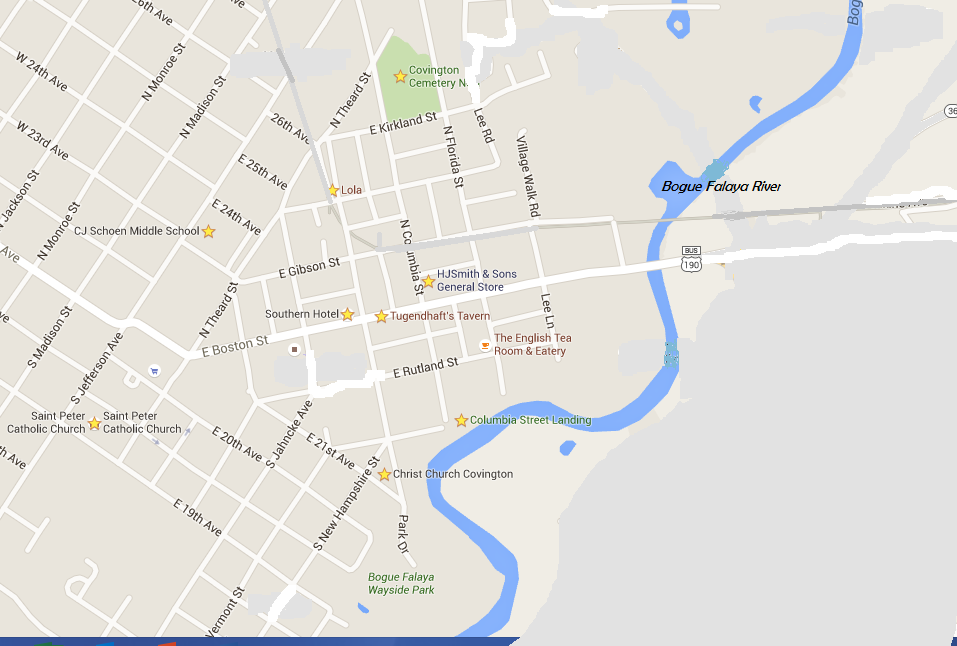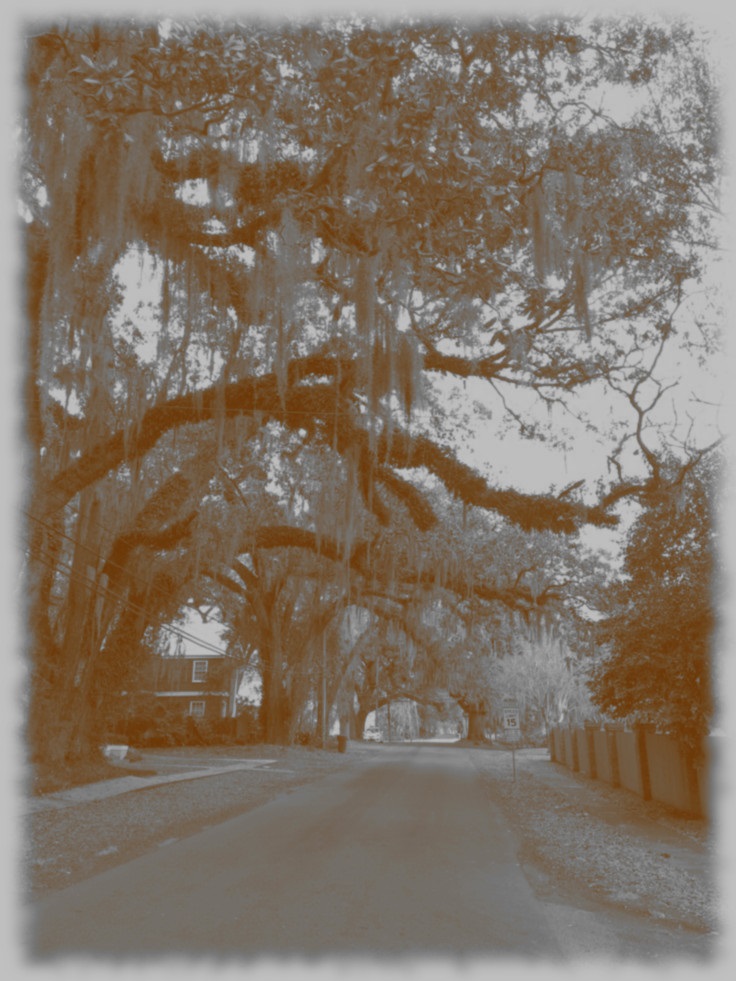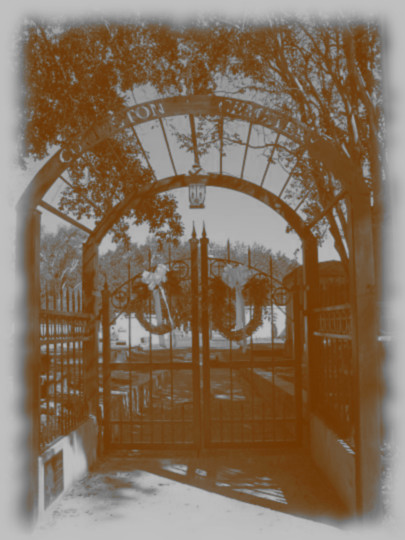Alt-1920s Covington: Difference between revisions
No edit summary |
|||
| (48 intermediate revisions by 2 users not shown) | |||
| Line 1: | Line 1: | ||
;[[Alt-1920s New Orleans]] | ;[[Alt-1920s New Orleans]] X [[Louisiana 1900's]] x [[Alt-1920s North Shore Communities]] | ||
[[File:Covington, LA 1920.png]] | |||
== '''Quote''' == | == '''Quote''' == | ||
| Line 8: | Line 11: | ||
== '''Economy''' == | == '''Economy''' == | ||
The economy of Covington is now based on the railroad, riverboats, and logging. This town has a considerable number of summer homes, where people from New Orleans come to wait out the malaria season. Several of the hotels specialize in Ozone water pools, for the health of their clients. A number of goods are shipped here by railroad, then shipped down river and across lake Pontchartrain to New Orleans. Timber from Abita Springs and Mandeville is hauled back up through here. In the fall cars are loaded also with local cotton. | |||
== '''Geography''' == | == '''Geography''' == | ||
Covington is a city in and the parish seat of St. Tammany Parish, Louisiana, United States. It is located at a fork of the Bogue Falaya and the Tchefuncte River. Most of Covington sits around 26 ft. above sea level. | |||
Covington will become part of the New Orleans–Metairie–Kenner Metropolitan Statistical Area. | |||
== '''History''' == | == '''History''' == | ||
The earliest known settlement by Europeans in the area was in 1800 by Jacques Drieux. In 1813, John Wharton Collins established a town there with the name of Wharton. In the fall of 1813 Rohit Narav came to town tried to dominate Wharton. When he failed Rohit dominated the attorney Jesse Jones and started a movement to circumvent Wharton. Rohit succeeded and eventually made a mockery of Wharton. Wharton is buried on the corner of the city cemetery directly across from the Covington Police Department. There are conflicting stories about how the city came to be named Covington. Many historians believe the city was renamed after General Leonard Covington, a hero of the War of 1812. However, local historian Judge Steve Ellis floats another theory centered around the suggestion by Jesse Jones, a local attorney, that the city be named in honor of the Blue Grass whiskey---made in Covington, Kentucky---enjoyed by town officials. Rohit didn't care what they called it, as long as it wasn't Wharton. | |||
In any case, Leonard Covington is the namesake of both towns. Initially, commerce was brought to Covington via boat up the Bogue Falaya River, which used the Tchefuncte River as a means of passage to and from Lake Pontchartrain. Then in 1888, the railroad came to town. | |||
== '''Orders and Societies of the City''' == | |||
* [[Freemasonry lodge #223]] | |||
* [[Ku Klux Klan of Covington]] | |||
== '''Population''' == | == '''Population''' == | ||
| Line 20: | Line 38: | ||
== '''Bars and Clubs''' == | == '''Bars and Clubs''' == | ||
* Atchelfulla's Saloon | * [[Atchelfulla's Saloon]] | ||
* [[Madam Thibideauxs]] | |||
* [[Gertreaux's]] | |||
<br> | <br> | ||
<br> | <br> | ||
------ | ------ | ||
== '''Cemeteries''' == | == '''Cemeteries''' == | ||
[[File:Covington cemetery 1920.jpg]] | [[File:Covington cemetery 1920.jpg]] | ||
<br> | <br> | ||
<br> | <br> | ||
* Covington Cemetery No. 1 | |||
* Wilson Cemetery | |||
------ | ------ | ||
== '''Churches''' == | == '''Churches''' == | ||
| Line 38: | Line 66: | ||
* Covington Lutheran | * Covington Lutheran | ||
* Carmelite Priory of the Bogue Falaya | |||
<br> | <br> | ||
| Line 47: | Line 77: | ||
* Judge Caesar Lucas Fitzsimmons | * Judge Caesar Lucas Fitzsimmons | ||
* Joeri Krusen (Town Marshall) | |||
------- | ------- | ||
== '''Crime''' == | == '''Crime''' == | ||
* Shea Carey Quirck | * Shea Carey Quirck | ||
| Line 53: | Line 86: | ||
----- | ----- | ||
== '''Citizens of the City''' == | == '''Citizens of the City''' == | ||
* [[Carmody Family]] | |||
* [[Drieux Family]] | |||
* [[Garrington Family]] | |||
* [[Krusen Family]] | |||
* [[Von Hofwegen Family]] | |||
* [[Whetterhorn Family]] | |||
* Pastor Jonathan Pullman | * Pastor Jonathan Pullman | ||
| Line 59: | Line 101: | ||
* Cecillia Gereaux | * Cecillia Gereaux | ||
** Marrian Gereaux | ** Marrian Gereaux | ||
* Augustus Léonce Steffen (Deputy Marshall, Deceased June 2, 1818) | |||
** Melony Von Hofwegen Steffen | |||
* Juste Plamondon | * Juste Plamondon | ||
| Line 64: | Line 109: | ||
* Jeannot Deschamps | * Jeannot Deschamps | ||
** Narsisse Marhaut Deschamps | ** Narsisse Marhaut Deschamps | ||
* [[Wob Kneller]] | |||
* Widow Claude Alix Deschamps | * Widow Claude Alix Deschamps | ||
* Félicienne Morgan Coupe | * Félicienne Morgan Coupe | ||
* Basil Gertreaux | |||
* Samson Gertreaux | |||
* Cecil the bartender | |||
* Pim Jansingh | |||
** Dorothea Gauthier Jansingh | |||
---------- | |||
== '''Current Events''' == | == '''Current Events''' == | ||
== '''Haunted Houses''' == | == '''Haunted Houses''' == | ||
* -- [[Whetterhorn Plantation]] | |||
== '''Holy Ground''' == | == '''Holy Ground''' == | ||
| Line 84: | Line 144: | ||
== '''Hotels & Hostels''' == | == '''Hotels & Hostels''' == | ||
* -- [[The Southern Hotel]] | * -- [[The Southern Hotel]] | ||
* -- The Von Hofenwegen House | |||
* -- The Emperial Hotel | |||
* -- The Waters of Health Recovery Spa | |||
* -- Colonel Henry's Oncological Retreat | |||
* -- [[Louis Fortiers Plantation of Health]] | |||
* -- Reynaulds Beds | |||
----------------- | |||
== '''Landmarks''' == | == '''Landmarks''' == | ||
* Columbia Landing | |||
== '''Major Businesses''' == | |||
* [[Covington Savings and Loan]] | |||
* Garringtons Sawmill | |||
* Koenigs Shipping & Warehouse | |||
* [[Fole De Carne Quantuso's]] | |||
------------- | |||
== '''Monuments''' == | == '''Monuments''' == | ||
| Line 92: | Line 180: | ||
== '''Newspapers''' == | == '''Newspapers''' == | ||
* The Farmer | |||
* Covington Tribune | |||
== '''Parks''' == | == '''Parks''' == | ||
| Line 100: | Line 192: | ||
== '''Schools''' == | == '''Schools''' == | ||
* [[St. Peters Scholastica]] | |||
* Schoen School | * Schoen School | ||
| Line 112: | Line 206: | ||
== '''Theaters''' == | == '''Theaters''' == | ||
The Bogue Falaya Theater | |||
== '''Travel To and From ''' == | |||
* Highway travel | |||
* River Travel | |||
** Numerous boats | |||
** Ferry to New Orleans via Lake Pontechetrain | |||
* Train Travel: | |||
** The New Orleans Great Northern, One going south at 10 A.M. the Mandeville, One going North as far as Jackson MI at 9 PM. | |||
** The New Orleans Great Nothern, One going South East to Sliddell, arrives at 5 AM, One going west arrives at 7 PM | |||
== <span style="color:#990033;"> ''' The Others of Covington ''' == | |||
<span style="color:#990033;"> [[Rohit Narav]] -- Child of the Swamp | |||
== <span style="color:#800000;">'''The Nosferatu of Covington''' == | == <span style="color:#800000;">'''The Nosferatu of Covington''' == | ||
<span style="color:#800000;"> ''While the stories of the undead in large cities has by far surpassed the original tradition of historical vampire folklore, it is in small towns, villages and rural settings that the traditional vampire can be found. I believe a coterie story set in a small rural town like Covington, Louisiana circa World War One to the current era has potential. While Mac started the game, he declined to continue it, probably due to a general lack of interest. Unfortunately, that didn't include me, as I rather enjoyed the low level characters and down-to-earth nature of the game. So, even though I am not playing, I have decided to keep the story alive with the limited hope that it will be picked back up later.'' -- "The Magister 12:36, 26 November 2015 (MST)" | <span style="color:#800000;"> ''While the stories of the undead in large cities has by far surpassed the original tradition of historical vampire folklore, it is in small towns, villages and rural settings that the traditional vampire can be found. I believe a coterie story set in a small rural town like Covington, Louisiana circa World War One to the current era has potential. While Mac started the game, he declined to continue it, probably due to a general lack of interest. Unfortunately, that didn't include me, as I rather enjoyed the low level characters and down-to-earth nature of the game. So, even though I am not playing, I have decided to keep the story alive with the limited hope that it will be picked back up later.'' -- "The Magister 12:36, 26 November 2015 (MST)" | ||
* -- [[Alt-1920s Covington Nosferatu Coterie Page]] | |||
* <span style="color:#800000;"> -- [[Hans Schultz]] -- Sewer Rat Elder of Frankfurt and sire of: Adair, Althea, Jane, Roger. | * <span style="color:#800000;"> -- [[Hans Schultz]] -- Sewer Rat Elder of Frankfurt and sire of: Adair, Althea, Jane, Roger. | ||
* -- <span style="color:#800000;"> [[Adair Simpkin]] -- Embraced Circa 1915 -- Sire ? -- Originally from Kentucky and fought in WWI. | * -- <span style="color:#800000;"> [[Adair Simpkin]] -- Embraced Circa 1915 -- Sire ? -- Originally from Kentucky and fought in WWI. | ||
* <span style="color:#800000;"> -- [[Althea | * <span style="color:#800000;"> -- [[Althea Carine Keefe]] -- Underground Chemist and would be Alchemist. | ||
* <span style="color:#800000;"> -- [[Jane | * <span style="color:#800000;"> -- [[Jane Marriette Tholberg]] -- American heiress and woman of international intrigue. | ||
* -- <span style="color:#800000;"> [[Roger Sinclair]] -- Embraced Circa 1918 | * -- <span style="color:#800000;"> [[Roger Sinclair]] -- Embraced Circa 1918 -- From Illinios and fought in WWI | ||
<br> | <br> | ||
<br> | <br> | ||
Latest revision as of 10:53, 22 January 2016
Quote
Appearance
Economy
The economy of Covington is now based on the railroad, riverboats, and logging. This town has a considerable number of summer homes, where people from New Orleans come to wait out the malaria season. Several of the hotels specialize in Ozone water pools, for the health of their clients. A number of goods are shipped here by railroad, then shipped down river and across lake Pontchartrain to New Orleans. Timber from Abita Springs and Mandeville is hauled back up through here. In the fall cars are loaded also with local cotton.
Geography
Covington is a city in and the parish seat of St. Tammany Parish, Louisiana, United States. It is located at a fork of the Bogue Falaya and the Tchefuncte River. Most of Covington sits around 26 ft. above sea level.
Covington will become part of the New Orleans–Metairie–Kenner Metropolitan Statistical Area.
History
The earliest known settlement by Europeans in the area was in 1800 by Jacques Drieux. In 1813, John Wharton Collins established a town there with the name of Wharton. In the fall of 1813 Rohit Narav came to town tried to dominate Wharton. When he failed Rohit dominated the attorney Jesse Jones and started a movement to circumvent Wharton. Rohit succeeded and eventually made a mockery of Wharton. Wharton is buried on the corner of the city cemetery directly across from the Covington Police Department. There are conflicting stories about how the city came to be named Covington. Many historians believe the city was renamed after General Leonard Covington, a hero of the War of 1812. However, local historian Judge Steve Ellis floats another theory centered around the suggestion by Jesse Jones, a local attorney, that the city be named in honor of the Blue Grass whiskey---made in Covington, Kentucky---enjoyed by town officials. Rohit didn't care what they called it, as long as it wasn't Wharton.
In any case, Leonard Covington is the namesake of both towns. Initially, commerce was brought to Covington via boat up the Bogue Falaya River, which used the Tchefuncte River as a means of passage to and from Lake Pontchartrain. Then in 1888, the railroad came to town.
Orders and Societies of the City
Population
- -- Town (2,942) - 1920 census
Attractions
Bars and Clubs
Cemeteries
- Covington Cemetery No. 1
- Wilson Cemetery
Churches
- First Baptist Church
- St. Peter Parish Catholic Church
- Covington Lutheran
- Carmelite Priory of the Bogue Falaya
City Government
- Hamilton Gereaux Mayor
- Judge Caesar Lucas Fitzsimmons
- Joeri Krusen (Town Marshall)
Crime
- Shea Carey Quirck
Citizens of the City
- Pastor Jonathan Pullman
- Alastasia Lepredoux
- Cecillia Gereaux
- Marrian Gereaux
- Augustus Léonce Steffen (Deputy Marshall, Deceased June 2, 1818)
- Melony Von Hofwegen Steffen
- Juste Plamondon
- Jeannot Deschamps
- Narsisse Marhaut Deschamps
- Widow Claude Alix Deschamps
- Félicienne Morgan Coupe
- Basil Gertreaux
- Samson Gertreaux
- Cecil the bartender
- Pim Jansingh
- Dorothea Gauthier Jansingh
Current Events
Haunted Houses
Holy Ground
- Christ Episcopal Church
- St. Joseph's Abbey
Hotels & Hostels
- -- The Von Hofenwegen House
- -- The Emperial Hotel
- -- The Waters of Health Recovery Spa
- -- Colonel Henry's Oncological Retreat
- -- Reynaulds Beds
Landmarks
- Columbia Landing
Major Businesses
- Garringtons Sawmill
- Koenigs Shipping & Warehouse
Monuments
Museums
Newspapers
- The Farmer
- Covington Tribune
Parks
Private Residences
Restaurants
Schools
- Schoen School
Shopping
- Dupre's Merchantile
- Carlson's Dry Goods
- Jolivet's Service Station
Theaters
The Bogue Falaya Theater
Travel To and From
- Highway travel
- River Travel
- Numerous boats
- Ferry to New Orleans via Lake Pontechetrain
- Train Travel:
- The New Orleans Great Northern, One going south at 10 A.M. the Mandeville, One going North as far as Jackson MI at 9 PM.
- The New Orleans Great Nothern, One going South East to Sliddell, arrives at 5 AM, One going west arrives at 7 PM
The Others of Covington
Rohit Narav -- Child of the Swamp
The Nosferatu of Covington
While the stories of the undead in large cities has by far surpassed the original tradition of historical vampire folklore, it is in small towns, villages and rural settings that the traditional vampire can be found. I believe a coterie story set in a small rural town like Covington, Louisiana circa World War One to the current era has potential. While Mac started the game, he declined to continue it, probably due to a general lack of interest. Unfortunately, that didn't include me, as I rather enjoyed the low level characters and down-to-earth nature of the game. So, even though I am not playing, I have decided to keep the story alive with the limited hope that it will be picked back up later. -- "The Magister 12:36, 26 November 2015 (MST)"
- -- Alt-1920s Covington Nosferatu Coterie Page
- -- Hans Schultz -- Sewer Rat Elder of Frankfurt and sire of: Adair, Althea, Jane, Roger.
- -- Adair Simpkin -- Embraced Circa 1915 -- Sire ? -- Originally from Kentucky and fought in WWI.
- -- Althea Carine Keefe -- Underground Chemist and would be Alchemist.
- -- Jane Marriette Tholberg -- American heiress and woman of international intrigue.
- -- Roger Sinclair -- Embraced Circa 1918 -- From Illinios and fought in WWI
Websites
https://en.wikipedia.org/wiki/Covington,_Louisiana


